Tabouli: the superfood vegan salad
You may or may not have heard of the popular Middle Eastern salad known as tabouli. It's origin is of the Levant region, which is basically the ancient version of modern-day Lebanon and Syria. Today, this is one of Lebanon's national dishes, although it is also popular in all of the countries in the Middle East. I grew up eating tabouli, as it has always been a staple food in my family's diet.
One of the first recipes that I have ever learned to make is the tabouli recipe because it is very easy. In fact, it is probably the simplest thing you can make, although it requires patience and care. Tabouli is a vegan salad using only four main ingredients: parsley, tomatoes, onions, bulgar (and two more ingredients: olive oil and lemon juice for seasoning). The best part is that every single one of those ingredients have so many health benefits, which I will explain later.
They are as follows:
- 2 bunches of parsley
- 3 large tomatoes
- 1 onion
- 1 cup of bulgar (also known as cracked wheat)
- 1 cup of water
- 4 or 5 tablespoons of olive oil (this can be adjusted to taste)
- 4 or 5 tablespoons of lemon juice (this can be adjusted to taste)
- Salt (to taste)
Note: the proportion of ingredients above will yield about 8 servings, which is perfect for if you are making this for a larger group of people. If you want to make this for just yourself and maybe another friend, then you can just cut the ingredients in half (ie: use 1 bunch of parsley, 2 medium tomatoes, half cup of bulgar, etc).
If you have never heard of bulgar, it is a type of cereal wheat widely used in Africa and the Middle East. You can usually find it in the international or ethnic aisle of the grocery stores.
What I really love about the tabouli salad is that you can really personalize it to your liking and play around with the ingredients. For example, if you want a greener salad, you can add an extra bunch of parsley. If you don't really like the bulgar (cracked wheat), you can add less or even substitute it with quinoa to make it gluten-free.
Procedure
- The first thing you should do is soak the bulgar in the water for about 20-30 minutes so that it absorbs all the water.
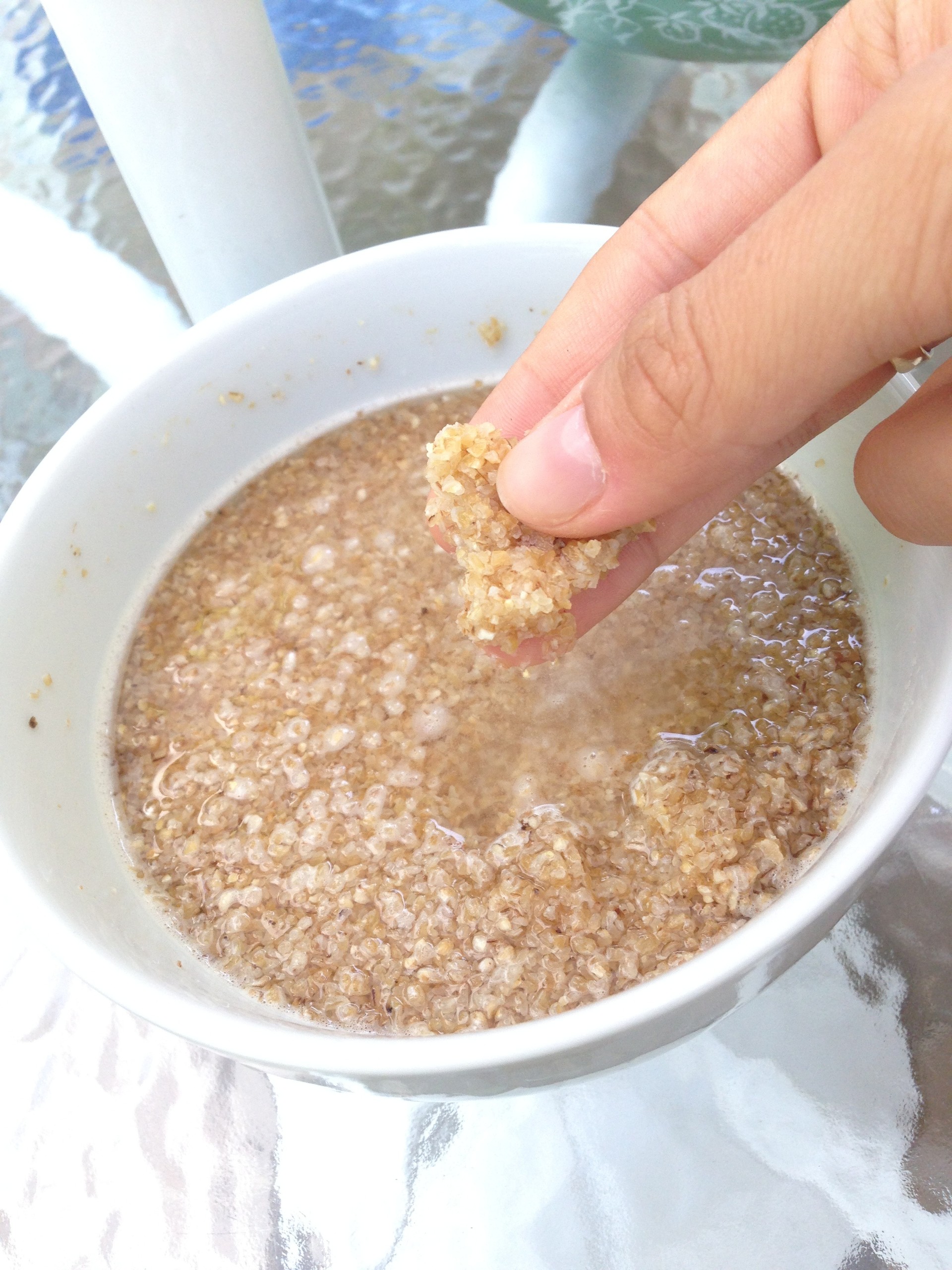
- While the bulgar is soaking, proceed to manually remove the parsley leaves from all the stems. This job is the most tedious part, but I think it is worth doing the work because the salad later will be smoother and more delicious. You can either throw the stems away or reuse them for cooking something else.
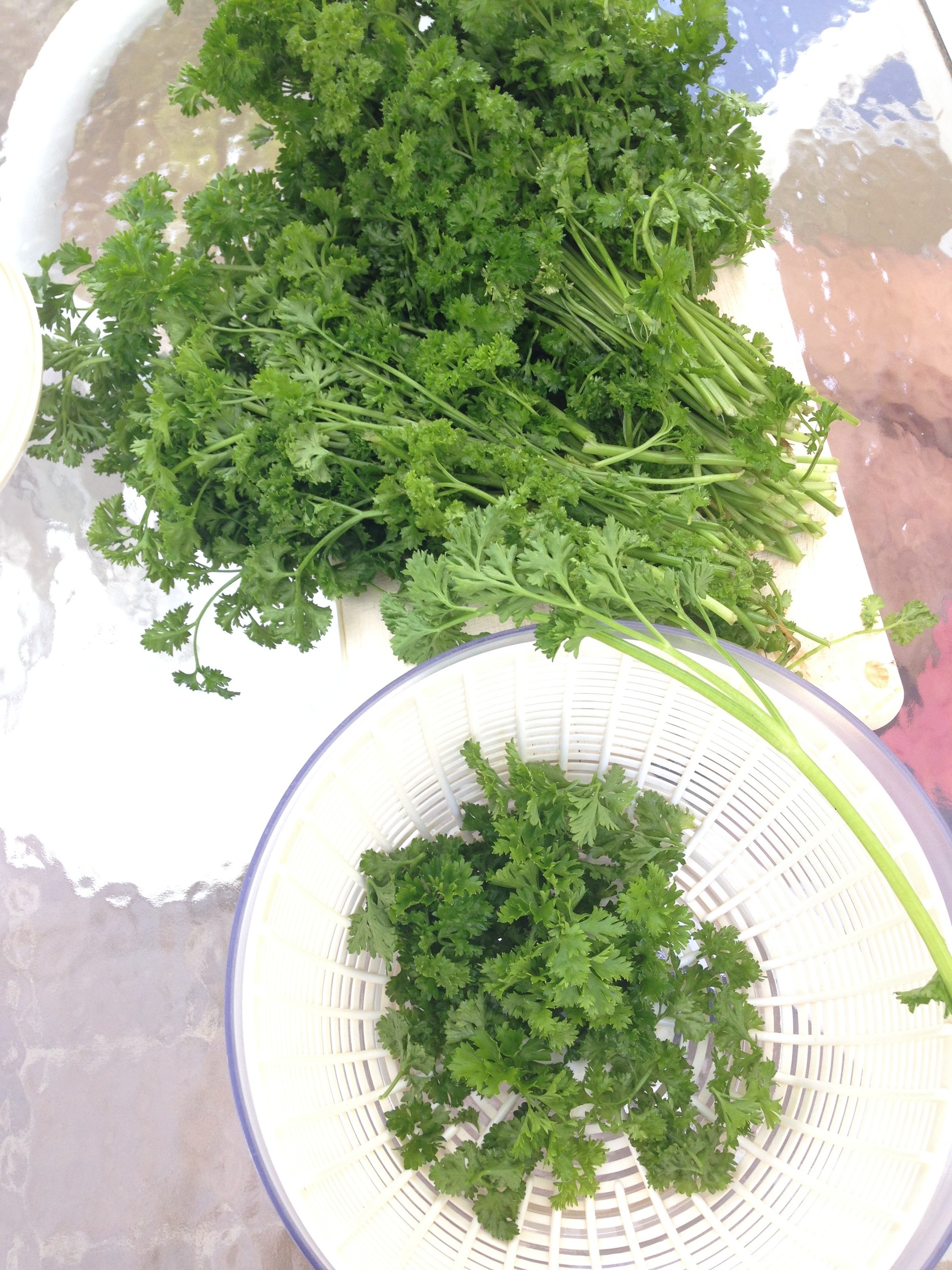
- Once the parsley is free of its stems, you can mince it either with a knife or, as I prefer to do it (because I'm lazy), throw them in the blender and have it chop them for you for a few seconds. Just make sure to not puree them.
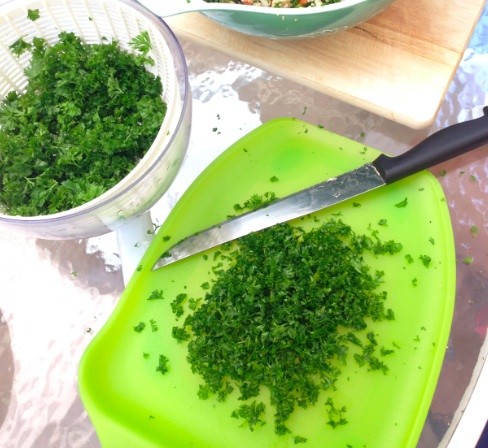
- Next, finely chop the onion (use the blender if you want).
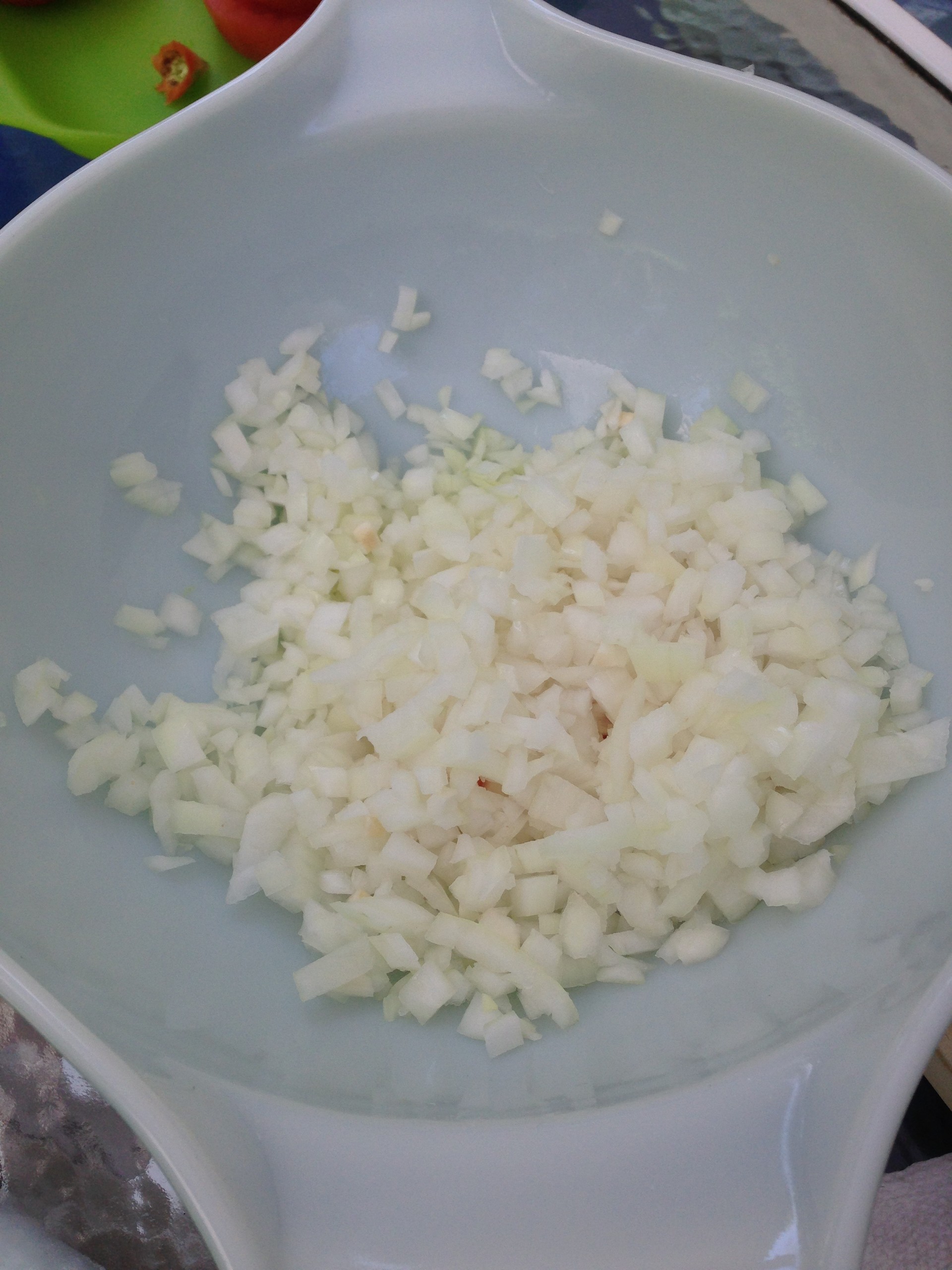
- Dice the tomatoes, and this time you have to use the knife. Don't put these in the blender because they'll become too watery and squishy.
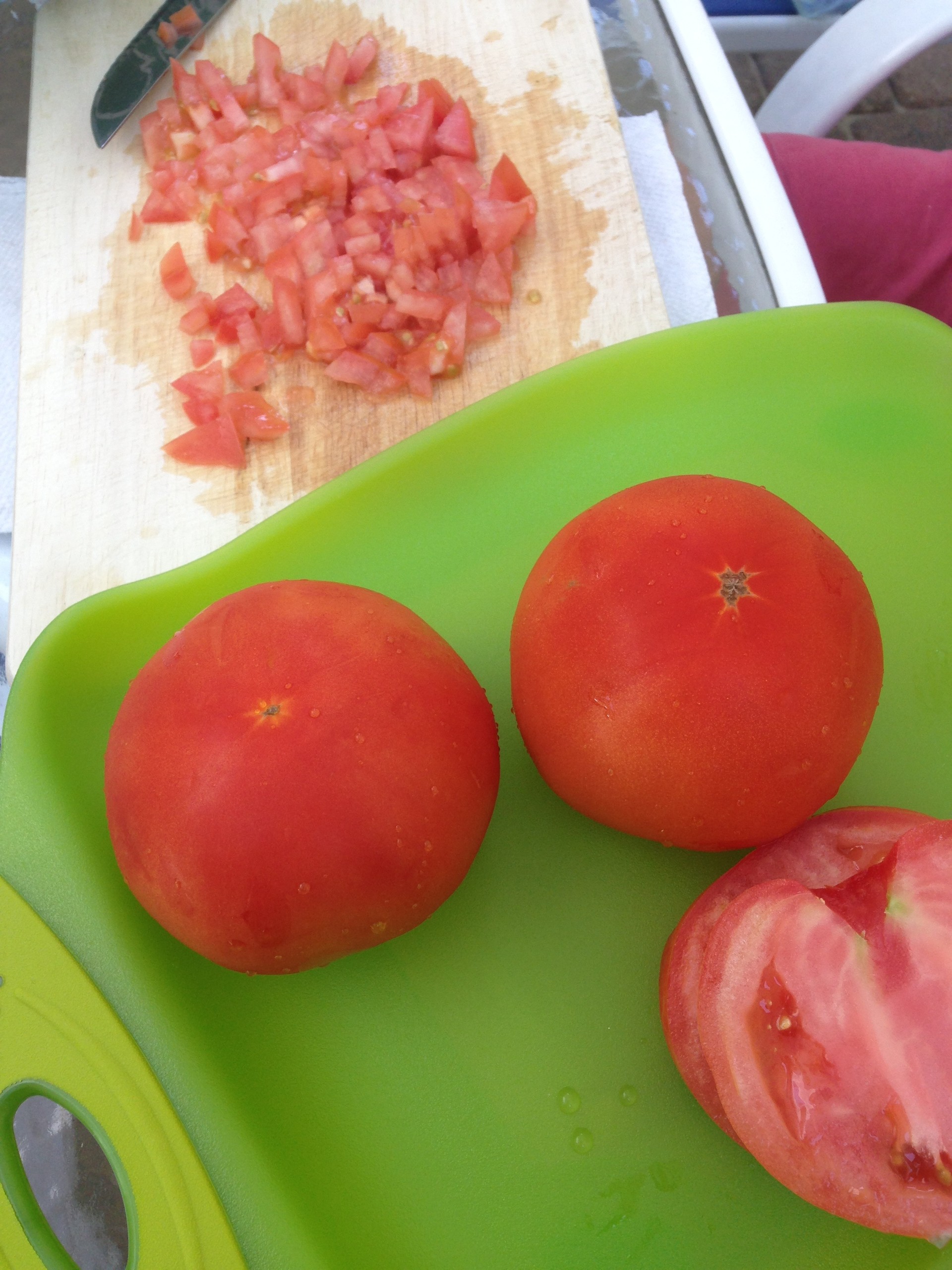
- Check the bulgar to make sure it is soft enough. Stir the bulgar around and then put a few grains in your mouth and chew them to make sure they're tender and not crunchy. If they're not tender enough, add some more water and let them sit for 10 more minutes. If there is an excess of water, you can strain the bulgar in a cheesecloth or in a spoon or bowl that has tiny holes.
- Mixall the ingredients together: the plump and tender bulgar, the minced parsley, the finely chopped onion and diced tomatoes.
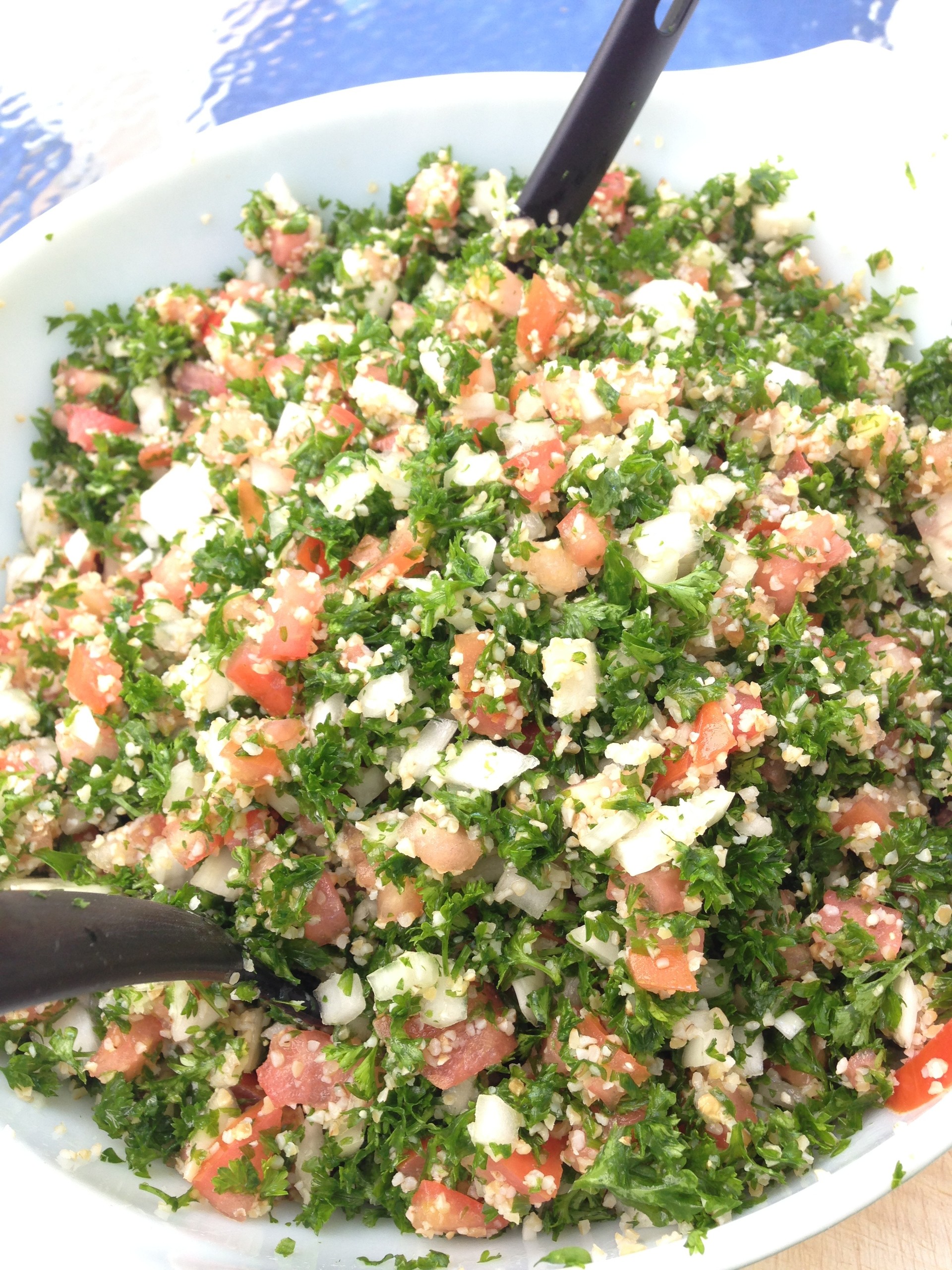
- Finally, add the olive oil, lemon juice, and a pinch of salt to taste.
Note: This final version actually isn't green enough for me. I personally prefer to have a much higher ratio of parsley and tomato to the bulgar. Actually, the authentic Lebanese tabouli does require a much larger proportion of parsley to bulgar because the parsley should dominate everything else. So in this case, I would add one more bunch of parsley, and probably another tomato too. The great thing about this dish is that it's easily personalizable, so you can adjust it to your liking even after you have finished making it.
If you don't plan to serve right away, you can put the tabouli in the fridge and it can last up to several days. When you want to serve it, take it out of the fridge a half an hour beforehand so that it is not too cold. Also, if you are not planning to eat it at all until many days later, you may want to consider waiting to cut the tomatoes until the same day that you want to eat it so that they are fresher.
Since I was little, most of my food memories include the presence of tabouli. This is because both of my grandmothers would make it, and my dad took it up as a hobby too (he's not bad, either). Yes, sometimes we would get the store-bought versions, but they are never as good as homemade.
I tend to associate food with certain memories (I guess most people do that), and tabouli is one which always takes me back to my happy, care-free childhood days when I would spend the weekend at my maternal grandmother's home and she would make an entire feast just for me.
For some reason, my grandmother would always be afraid that I would starve to death or something, and it's thanks to her that today my stomach is able to stretch to unbelievable volumes so that I can always finish my plate, no matter how much food there is. I've always been asked where I put all my food, and whether I have a hollow leg to store it all. I'm not sure if this is a good or a bad thing, but at least I don't waste food and I was taught to not be picky and eat well. Thanks yaya.
Although I had always eaten abnormally large amounts of food in the presence of my grandmother, I miraculously never became overweight. The secret of this is because everything she made was so healthy. I'm not saying it's ok to fall into the temptations of gluttony, and it's not a good idea to have "too much of a good thing", but at least you know that I tell you the truth when I say it's healthy.
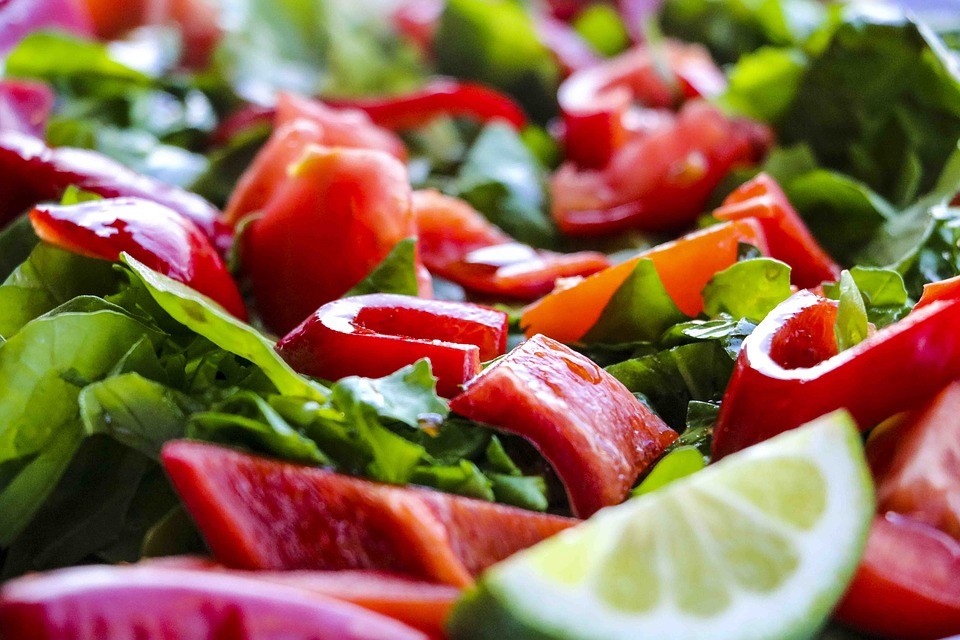
For those who would like a more detailed explanation, keep reading.
The health benefits of tabouli
Since I have studied biology in my university and one of my specialties is in nutrition, I am very enthusiastic to break down every ingredient of this tabouli recipe and share with you each of their health benefits.
Parsley
This food may help improve the following:
- Atherosclerosis (cardiovascular disease)
- Diabetes
- Asthma
- Rheumatoid arthritis
- Osteoarthritis
- Lose weight
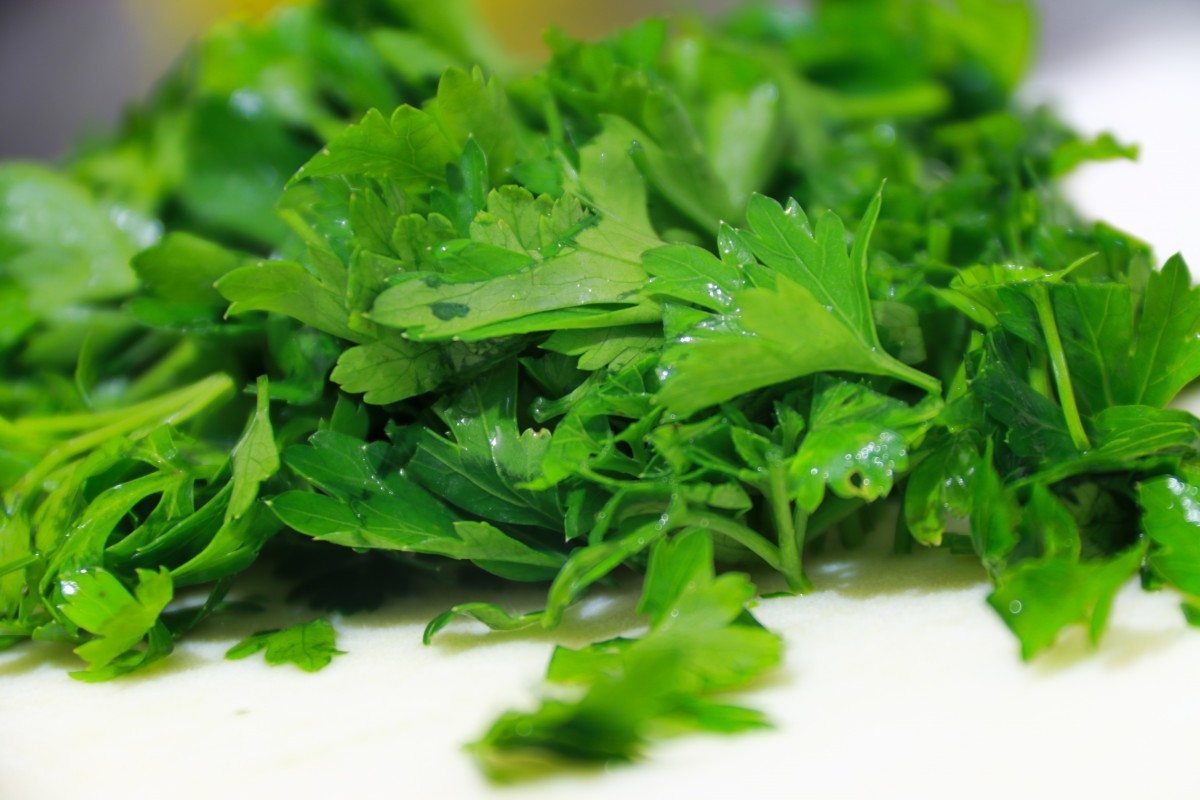
Parsley helps to avoid cardiovascular diseases. The plant contains folic acid which plays a role in preventing atherosclerosis, heart attacks and strokes.
The parsley superfood is known to be anti-carcinogenic, meaning that it can fight against cancer. This property is thanks to the fact that parsley contains a compound called myristicin that inhibits the formation of tumors. This also means that people who smoke or are constantly exposed to carcinogens should try to consume more parsley (eat more tabouli! ) because it has the ability to neutralize chemical and carcinogenic agents.
The antioxidants included in parsley (especially luteolin) combine with certain molecules included in the body to prevent damage caused by free radicals. One of the antioxidants found in parsley is beta-carotene, which works to help lose fat and it is also good for the health of the eyes. Parsley prevents certain diseases thanks to vitamins A and C. The latter eliminates toxins and strengthens the immune system.
Parsley is known to improve digestion and intestinal transit by regularizing the intestinal flora, serving to relieve or prevent any spasms produced in the colon and reduces the symptoms of indigestion.
Consuming parsley can help prevent and improve kidney failure or urinary tract infection, as it has the ability to naturally clean the kidneys. The diuretic properties serve to purify and detoxify the body. However, it should be taken into account that it is not recommended for those with frequent kidney stones or the tendency to develop them because the amount of oxalic acid in parsley can increase the formation of kidney stones.
Parsley is anti-inflammatory, avoids infections and reduces symptoms in chronic conditions. Because it is high in vitamin C, parsley protects the body from particular inflammatory polyarthritis and any swelling in general.
A natural way to counteract the effects of fatigue and lack of energy is to eat parsley. Due to its great contribution of minerals (especially iron and phosphorus) this seasoning increases our energy and helps us to fulfill all our daily obligations.
Onions
This vegetable contains group B vitamins necessary for the proper functioning of the nervous and immune systems, as well as vitamin E and C, which have strong antioxidant power.
Onions have a high content of water and fiber and low in fats and sugars. Similar to parsley, one of the best known properties of the onion is its diuretic effect, so it is recommended for people with renal failure, gout or hyperuricemia, kidney stones, edemas or hypertension.
Onions are also a bactericide and fungicide, so they are helpful in treating colds and respiratory conditions. They may even be able to treat asthma and allergies.
They can also help lower cholesterol and promote heart health.
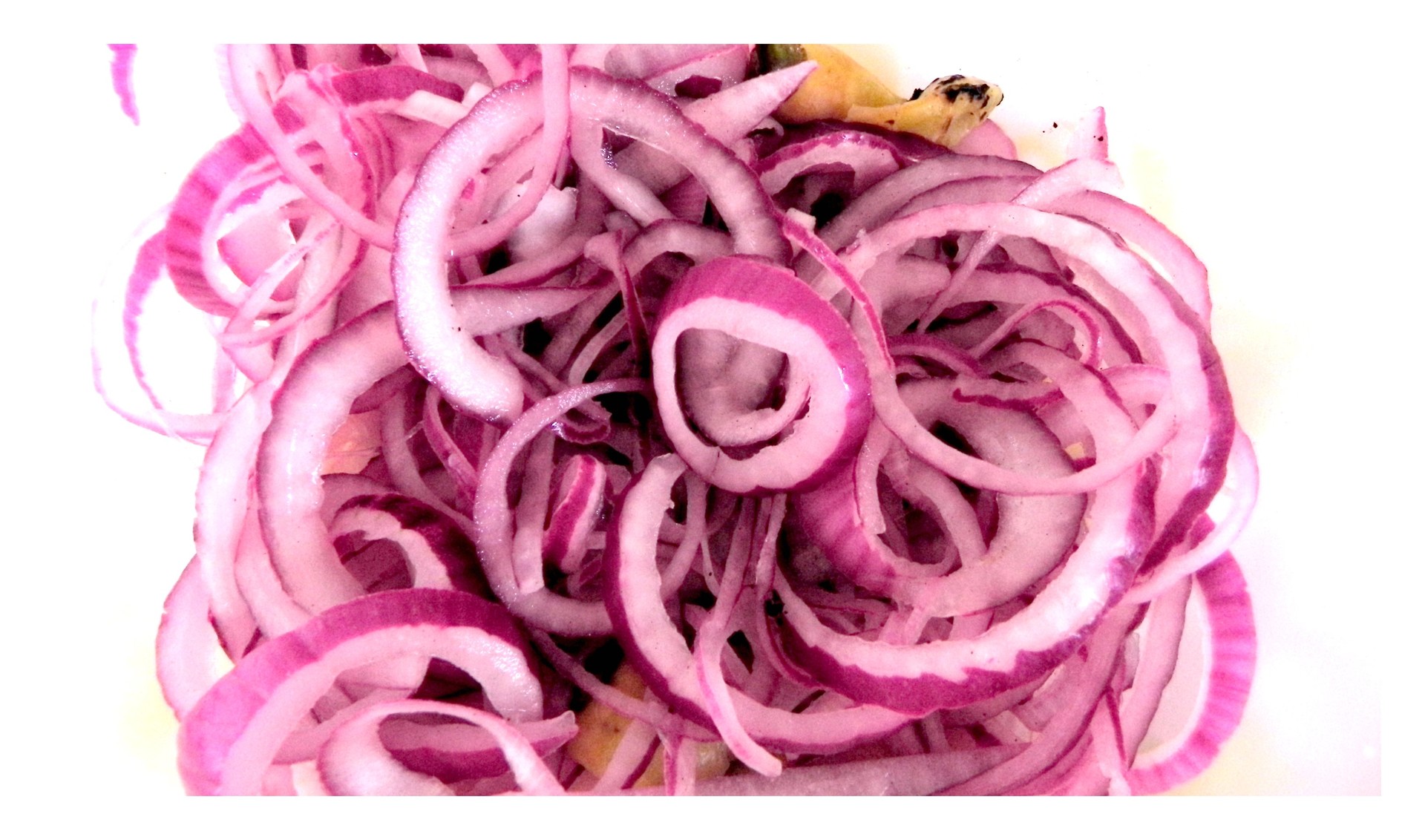
Tabouli is especially healthy because the onions in it are added raw, and eating them raw this is the best way to maximize their benefits. For example, when the onion is consumed raw, it is able to eliminate the toxins and yeasts that are produced in the stomach after digestion.
Tomatoes
Thanks to their high content in the antioxidant lycopene, tomatoes may prevent prostate cancer in men. They have vitamins A, B and C, and it is ideal in diets to lose weight. It is also rich in minerals such as potassium, phosphorus and magnesium.
Tomatoes are low in sodium, so they are recommended for people with hypertension. They also protect against cardiac problems.
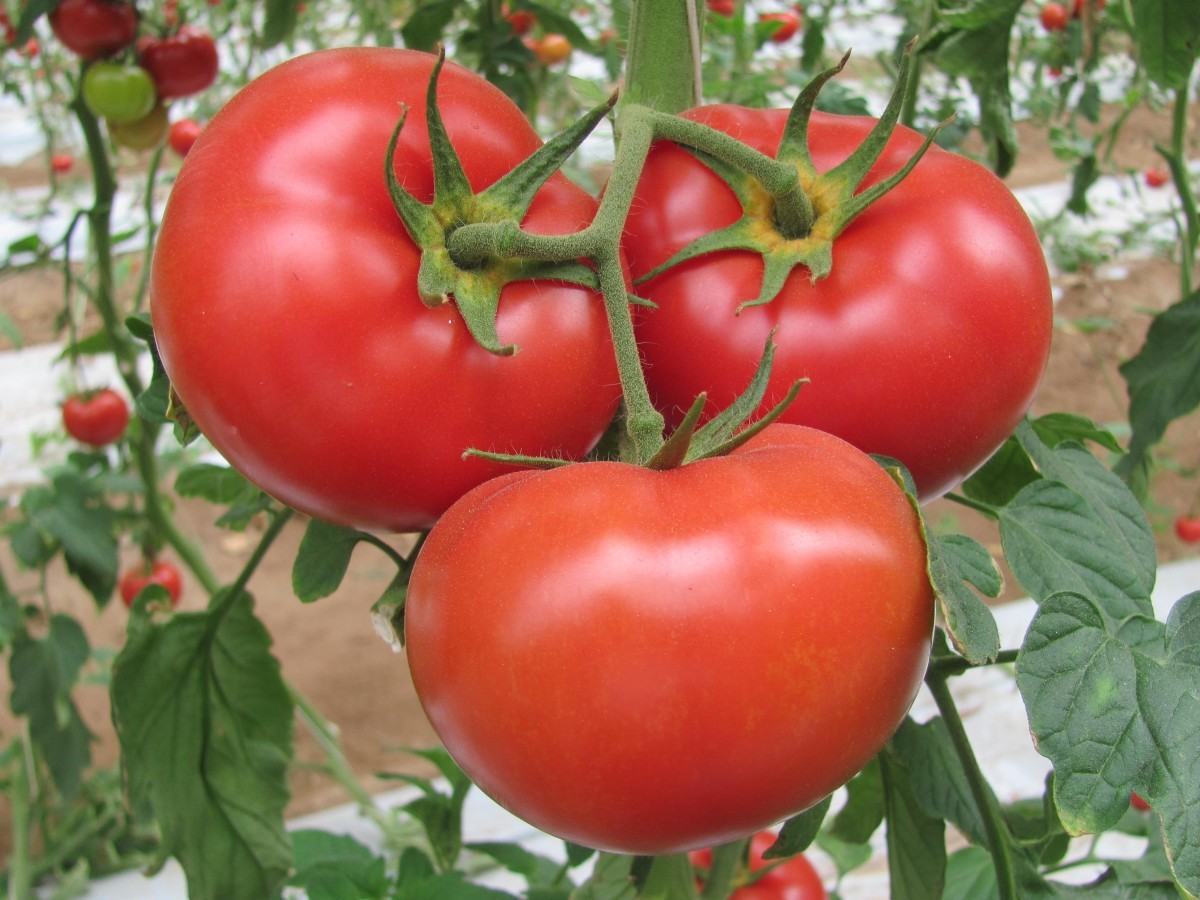
It is best to consume tomatoes without peeling them because their skin contains a high amount of fiber, which is good for your digestion. This is perfect because in the tabouli recipe, the tomatoes are not peeled at all.
Bulgar
This food is great for athletes as it is rich in starch as well as carbohydrates. On the other hand, it is also very low in fat and in calories, making it ideal for slimming diets as well as for cholesterol-lowering diets.
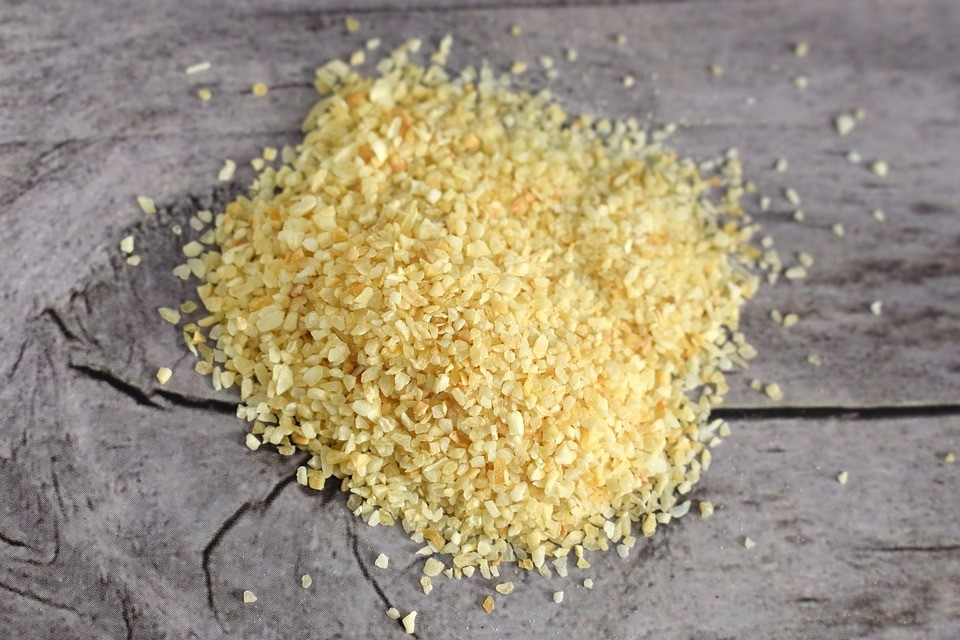
Bulgar is also a good food for digestion because it is so high in fiber. In fact, the one cup of bulgar used in the tabouli recipe provides 25% of the recommended daily serving of fiber. Not only is this wheat high in manganese, magnesium, and iron, it is also an excellent food for vegans because it is a good source of plant-based protein.
Olive oil
Due to its high content of healthy monounsaturated fats, olive oil could delay or prevent mental deterioration, which is linked to mental illnesses such as Alzheimer's.
Olive oil may help to relieve pain, including muscle and joint pain, due to its anti-inflammatory action.
This antioxidant-rich oil may help prevent cancer. Olive oil can also help regulate blood sugar levels and insulin production because it contains healthy fats such as Omega-3s. In other words, olive oil can be helpful for people with diabetes.
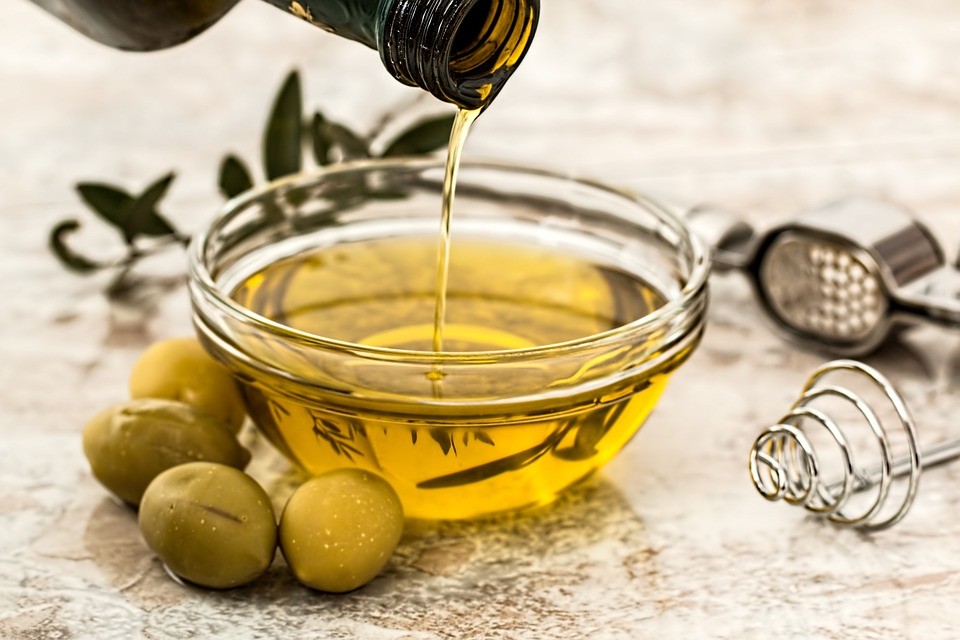
Olive oil helps to strengthen the immune system because it is rich in antioxidants and other essential nutrients that can provide protection against disease.
Regularly consuming a moderate amount of olive oil can help lower high blood pressure. Olive oil is a good source of monounsaturated fats which increase good cholesterol levels and help to reduce bad cholesterol. This can help to prevent cardiovascular problems.
Lemon juice
Despite being an acidic juice, lemons actually regulate and reduce excess acidity in the body. Lemons also help to detoxify and purify the body, greatly helping the liver, gallbladder and kidneys. Their calcium and potassium levels are factors which aid in combating fluid retention, helping the kidneys to properly do their job.
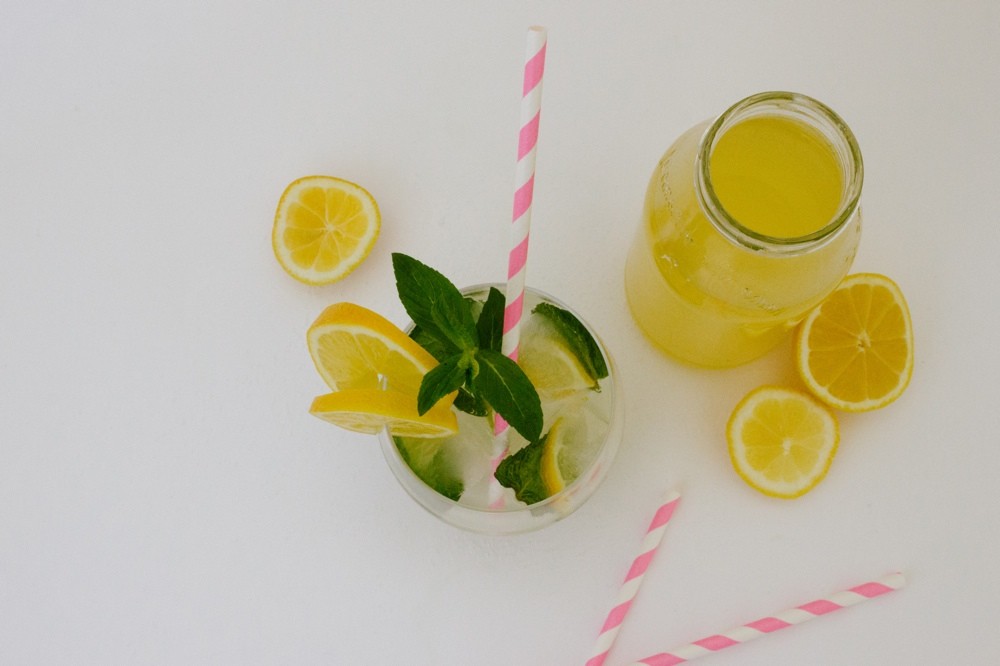
Just like the other ingredients, lemon juice also plays a role in preventing cancer and slowing aging since it is a powerful antioxidant. It mainly contains vitamin C, but also flavonoids and beta-carotenes. Vitamin C not only supports the immune system, but it also prevents diseases such as hypertension, cholesterol, varicose veins, hemorrhoids or arteriosclerosis.
Perhaps now you can understand why I love tabouli so much: it is extremely easy to make, it is delicious and it is probably one of the healthiest salads that exist in the world. Stay updated for my next post on the healthy recipe blog.
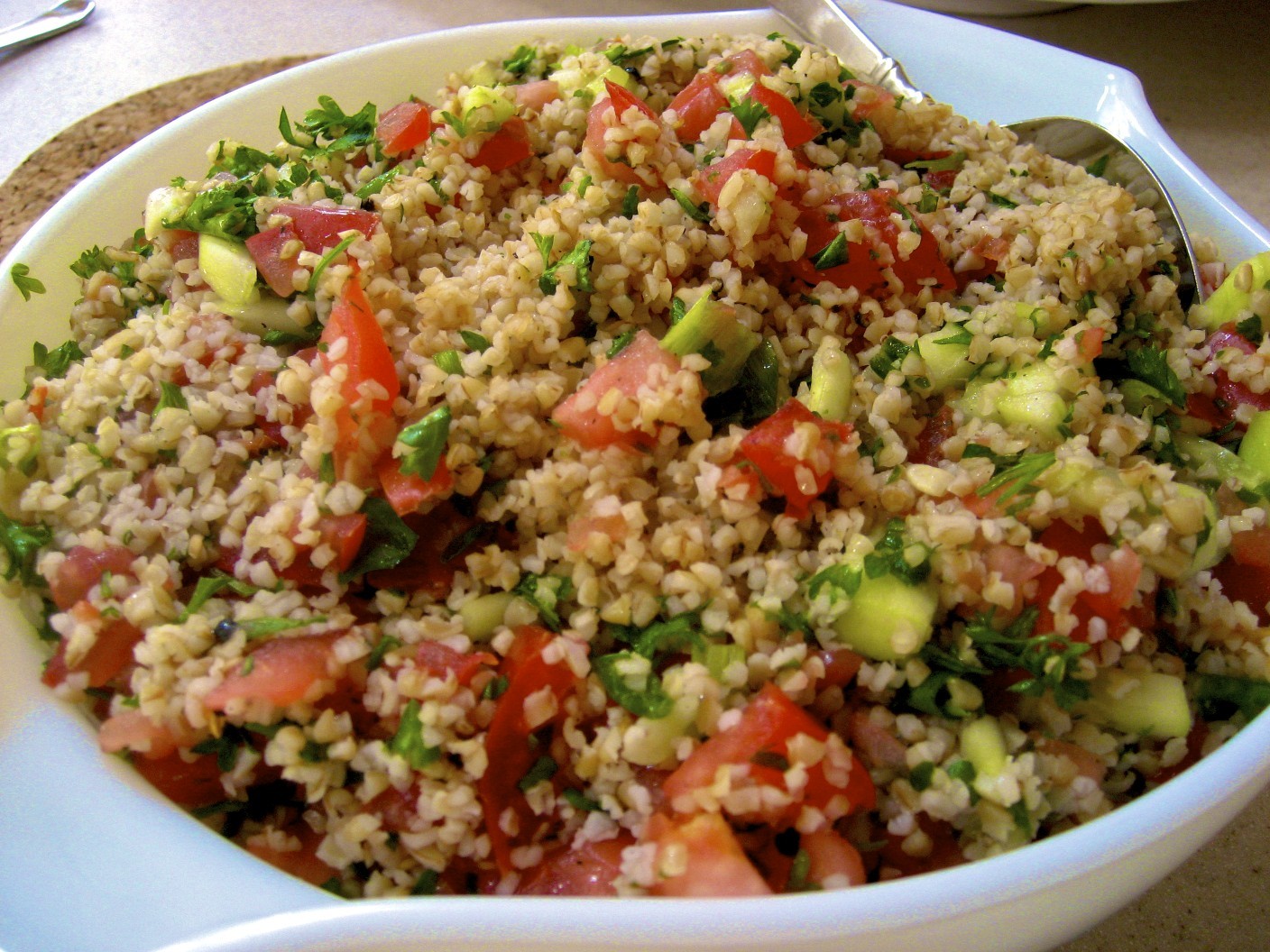
Hope you enjoy it!
Photo gallery
Content available in other languages
- Español: Tabule: el superalimento vegano
Want to have your own Erasmus blog?
If you are experiencing living abroad, you're an avid traveller or want to promote the city where you live... create your own blog and share your adventures!
I want to create my Erasmus blog! →

















Comments (0 comments)